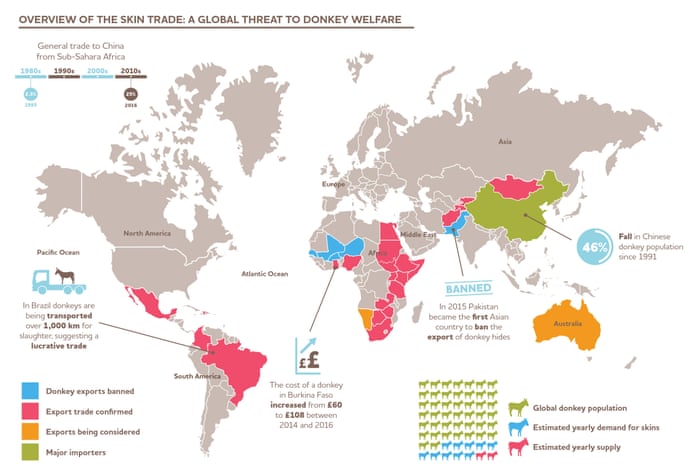- Donkey skin is prized for its "medicinal" properties in China, including enhancing libido.
- African countries are slaughtering the animals to meet Chinese demand, and Australia is considering following suit.
By Katrina Yu


Everyday Claire Hu drinks a herbal broth with one unusual ingredient: donkey skin.
It's prescribed by a traditional Chinese medicine, or TCM, doctor to treat menstrual problems.
"It regulates your period, and after taking it your body gets warm. It improves blood circulation," says Ms Hu.
For centuries donkey hide has been sold in China as a tonic that can cure a variety of ailments, including insomnia, low immunity and low libido.
Processed and sold as gelatin or powder, the products price has soared in recent years.
One kilo now sells for over $500.
"It regulates your period, and after taking it your body gets warm. It improves blood circulation," says Ms Hu.
For centuries donkey hide has been sold in China as a tonic that can cure a variety of ailments, including insomnia, low immunity and low libido.
Processed and sold as gelatin or powder, the products price has soared in recent years.
One kilo now sells for over $500.
It's now considered more a luxury health product, often bought as a gift, rather than prescription.

E-jiao, or donkey-hide gelatin.
Today demand is outstripping supply.

E-jiao, or donkey-hide gelatin.
Today demand is outstripping supply.
In the 1990s donkeys in China numbered 11 million.
Two decades later the number almost halved at six million.
Animal rights activist Alex Mayers from Donkey Sanctuary UK says he has heard reports of populations on the mainland now dropping to as low as three million.
"Donkeys are very sensitive creatures and become stressed. They are unable to reproduce well when farmed in such large numbers,” says Mr Mayer.
“We can’t see a way that donkeys could possibly be farmed in a way that would allow them good enough welfare and allow them to reproduce to keep the trade at its current level."
The cost of donkey meat, common in central Chinese cuisine, is also increasing due to the demand for skin.
Gao Shiqiao, the manager of a popular donkey meat restaurant in Beijing, says it's becoming more and more expensive to source the animal.
"People like the meat because it’s lean and tasty. But because of donkey skins the price is going up so quickly. If it wasn’t for the skins, it would be fairly cheap,” says Mr Gao.
To satisfy demand China is importing donkeys from around the world, mainly Africa.
Australia is also considering following suit, with the Northern Territory government currently investigating the viability of the trade of feral donkeys in the state.
In a statement to SBS World News, the Northern Territory government says it is "responding to investment enquiries about the opportunity to establish donkey farming and processing facilities."
This has Alex Mayers and his team worried.
"You'd be feeding into a trade and sustaining a trade which is catastrophic for people and animals in other parts of the world."
Niger and Burkina Faso banned donkey exports to China late last year, after slaughter of the animal got out of hand, impacting local farmers relying on working donkeys.
Egypt and Pakistan are the latest countries to discuss trading donkeys with China.
Animal rights activist Alex Mayers from Donkey Sanctuary UK says he has heard reports of populations on the mainland now dropping to as low as three million.
"Donkeys are very sensitive creatures and become stressed. They are unable to reproduce well when farmed in such large numbers,” says Mr Mayer.
“We can’t see a way that donkeys could possibly be farmed in a way that would allow them good enough welfare and allow them to reproduce to keep the trade at its current level."
The cost of donkey meat, common in central Chinese cuisine, is also increasing due to the demand for skin.
Gao Shiqiao, the manager of a popular donkey meat restaurant in Beijing, says it's becoming more and more expensive to source the animal.
"People like the meat because it’s lean and tasty. But because of donkey skins the price is going up so quickly. If it wasn’t for the skins, it would be fairly cheap,” says Mr Gao.
To satisfy demand China is importing donkeys from around the world, mainly Africa.
Australia is also considering following suit, with the Northern Territory government currently investigating the viability of the trade of feral donkeys in the state.
In a statement to SBS World News, the Northern Territory government says it is "responding to investment enquiries about the opportunity to establish donkey farming and processing facilities."
This has Alex Mayers and his team worried.
"You'd be feeding into a trade and sustaining a trade which is catastrophic for people and animals in other parts of the world."
Niger and Burkina Faso banned donkey exports to China late last year, after slaughter of the animal got out of hand, impacting local farmers relying on working donkeys.
Egypt and Pakistan are the latest countries to discuss trading donkeys with China.
Whether or not Australia joins that list sales on the mainland show no sign of slowing.
Aucun commentaire:
Enregistrer un commentaire